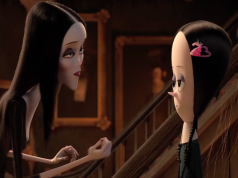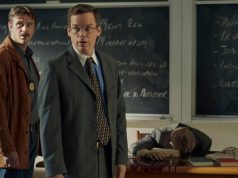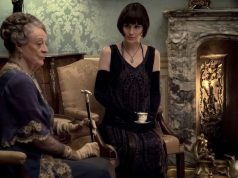Most of my knowledge of the “Star Trek” mythos comes not from watching the original series (which I’ve never done) or the films with the original cast (ditto), but simply by osmosis, living in a society where “Star Trek” is a huge part of pop culture. So while I’m not invested enough to care deeply about the quality of J.J. Abrams’ highly anticipated new “Star Trek” reboot, I know enough to say with some confidence that he has gotten it almost exactly right.
How can Trekkies — or, as they prefer to be called, Trekkie-Americans — not love a film that re-imagines the characters’ origins this cleverly, that incorporates so many of the familiar “Trek” details (“I’m a doctor, not a physicist!”) into such a sleek, vigorous new story? Once you’re past the initial heresy of anyone other than William Shatner playing Kirk, anyone other than Leonard Nimoy playing Spock, et cetera, what is there for “Trek” fans to complain about?
And for the rest of us, who don’t care about the Starship Enterprise in particular and just want to see a good movie? We win, too. “Star Trek” is spectacularly entertaining — fast-paced, glib, thrilling, and slickly produced. It’s better than most summertime action romps even bother trying to be.
What emerges most is a sense of fun. Abrams and his writers, Roberto Orci and Alex Kurtzman (who also wrote the dimwitted “Transformers”), are respectful of the source material, but they don’t let it stifle their creativity. Their allegiance, first and foremost, is to havin’ a good time; if they must slightly alter some “Trek” characters’ biographies in the process, so be it. And since Abrams and company are smart, the film avoids most of the lapses in logic and storytelling that make audiences scoff at a film like, say, “X-Men Origins: Wolverine.”
(I’m having a hard time reconciling the fact that Orci and Kurtzman also wrote “Transformers.” I have to assume that film’s idiocy and this one’s intelligence have to do with the difference in directors: Abrams, who created TV’s “Alias” and “Lost,” is savvy and self-aware; Michael Bay, who made “Transformers,” is a moron.)
It is the 23rd century. Most of the familiar characters are cadets at Starfleet Academy, and the Enterprise is just coming off the assembly line. James T. Kirk (Chris Pine, comfortably adopting Shatner’s inflections and mannerisms without impersonating him), the son of a starship commander, is almost parodically cocky and arrogant, having joined the academy only after Capt. Pike (Bruce Greenwood) convinced him he had the potential to do more than chase skirts in Iowa. He is smitten with Uhura (Zoe Saldana), a brilliant classmate and linguistics expert who won’t give him the time of day, and best friends with Leonard McCoy (Karl Urban), a slightly older and frequently exasperated doctor.
Meanwhile, there is Spock (Zachary Quinto), an outcast on his own planet, Vulcan, because his mother was a human. Like all Vulcans, Spock is ruled by logic and reason, which puts him at odds with the reckless and hotheaded Kirk, once they meet. It doesn’t help that they meet in the context of Kirk beating an impossible-to-beat simulation that Spock devised for Starfleet Academy.
When the planet Vulcan is threatened by an unknown enemy, the United Federation of Planets, its resources stretched thin, must call up its cadets and put the Enterprise into action earlier than expected. The threat, as it turns out, is from “a particularly troubled Romulan” named Nero (Eric Bana), who has a sinister agenda that relates to — well, golly, it relates to everything. Just you wait and see.
The goal here was to devise a story that would bring the Enterprise crew together earlier than it happened in the original “Star Trek” timeline. (Wikipedia tells me that in the TV series, Spock had already served on the Enterprise, under Capt. Pike, for 10 years before Kirk arrived.) Without spoiling anything, I think Abrams, Orci, and Kurtzman have done this as plausibly as can be expected. (You already know that Leonard Nimoy appears as an elderly Spock, so the notion that the film might involve time travel shouldn’t surprise you.) This is not a prequel, but a sort of alternate universe, where things happened this way instead of that way. And, of course, non-“Trek” aficionados don’t care anyway.
I might quibble with the Jack Bauer-like speed with which people are promoted from prisoner to captain, or some characters’ ability to master brand-new technology within seconds of being introduced to it, or the number of times Kirk is left dangling from a dangerous precipice. (And what’s with all those catwalks not having guardrails?) But there’s no sense dwelling on minor criticisms when, overall, the film is so gosh-darned enjoyable. Backup characters like Sulu (John Cho) and Chekov (Anton Yelchin) are given their moments to shine; Simon Pegg is a joy as cranky engineer Scotty; the villains are genuinely fearsome; the story is exciting, and it moves along at a breezy clip.
Then there is the spirited and humorous interplay between Pine, Quinto, and Urban as Kirk, Spock, and McCoy. All three actors give star-making performances — where did this Chris Pine person come from?! — while simultaneously reinventing a trio of beloved characters deftly but humbly. There is no sense that they wish to overshadow their predecessors. Indeed, I see no ego anywhere here — just talented actors working hard to create vivid, complex characters that the audience will care about. They succeeded. Who’s up for a sequel?
A- (2 hrs., 6 min.; )





